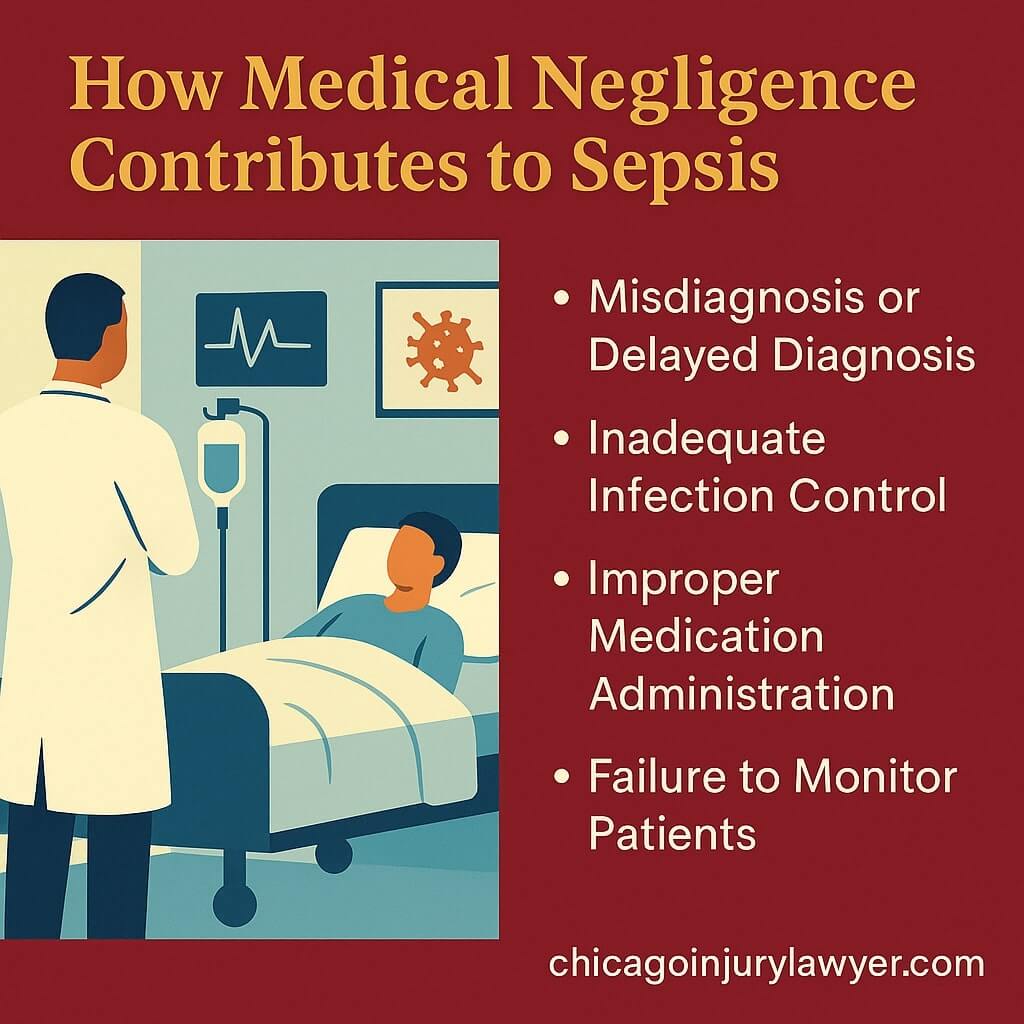Sepsis is a severe and life-threatening condition caused by the body’s extreme response to an infection. When sepsis occurs due to medical negligence, the consequences can devastate individuals and families alike. At our law firm, we are dedicated to helping victims in Bureau County secure justice and compensation for their suffering. Our experience and compassion drive us to fight for your rights every step of the way.
Call us now at 312-261-5656 for a free, no-obligation consultation, available 24/7. With our no-fee-unless-we-win policy, you can focus on your recovery while we handle the rest.
What Is Sepsis?
Sepsis occurs when the body’s immune system overreacts to an infection, triggering widespread inflammation and organ damage. Common infections, including those caused by bacteria, viruses, or fungi, can lead to sepsis if not promptly treated. Early symptoms often include fever, rapid heart rate, confusion, or difficulty breathing. If untreated, sepsis can quickly progress to septic shock, resulting in organ failure or death.
Common Causes of Sepsis
Sepsis often results from preventable medical errors or negligent care. Examples include:
- Failure to diagnose infections in time.
- Delayed or inappropriate treatment with antibiotics.
- Unhygienic conditions in hospitals or nursing homes.
- Errors during surgery or postoperative care.
- Neglect in wound care or catheter management.
Who Is at Risk of Sepsis?
While anyone can develop sepsis, some individuals are more vulnerable due to age, medical conditions, or circumstances. High-risk groups include:
- Elderly patients in nursing homes or hospitals.
- Infants and children with undeveloped immune systems.
- Post-surgical patients recovering from major operations.
- Individuals with chronic illnesses such as diabetes or cancer.
these risk factors underscore the importance of vigilance and proper medical care.
How Medical Negligence Contributes to Sepsis

Sepsis often develops because medical professionals fail to uphold acceptable standards of care. When negligence occurs, it can leave patients vulnerable to devastating outcomes. Examples include:
- Misdiagnosis or Delayed Diagnosis: Physicians may overlook early signs of infection, delaying treatment and allowing sepsis to worsen.
- Inadequate Infection Control: Hospitals and nursing homes that fail to maintain cleanliness expose patients to harmful bacteria.
- Improper Medication Administration: Incorrect dosages or delays in administering antibiotics can lead to complications.
- Failure to Monitor Patients: Ignoring signs of infection or changes in vital signs can allow sepsis to develop unnoticed.
The Impact of Sepsis on Victims and Families
Sepsis has both immediate and long-term effects that extend beyond physical health. Victims often face:
- Prolonged Hospital Stays: Intensive treatment and rehabilitation are common.
- Permanent Organ Damage: Sepsis survivors may suffer from kidney, heart, or lung impairment.
- Emotional Trauma: The experience of sepsis can lead to anxiety, depression, or PTSD.
- Financial Strain: Medical bills, lost wages, and ongoing care create overwhelming financial burdens.
For families, the emotional and financial toll of supporting a loved one with sepsis is immense. When negligence causes this suffering, pursuing legal action can help provide closure and compensation.
Your Rights as a Sepsis Victim
If sepsis was caused by medical negligence, you have the right to seek justice. Filing a personal injury lawsuit allows you to hold negligent parties accountable and recover damages. Compensation can cover:
- Medical Expenses: Past and future costs of treatment and rehabilitation.
- Lost Income: Wages lost due to your inability to work.
- Pain and Suffering: Emotional and physical distress caused by sepsis.
- Loss of Quality of Life: Compensation for the long-term effects on your health and lifestyle.
Why You Need an Experienced Lawyer
Sepsis cases are complex and require detailed evidence to prove negligence. Our experienced legal team has the skills and resources needed to build a strong case. Here’s how we can help:
- Case Investigation: We thoroughly examine medical records, witness statements, and hospital policies to uncover evidence of negligence.
- Expert Collaboration: Our network of medical professionals helps confirm that standards of care were breached.
- Valuation of Damages: We calculate the full extent of your losses, ensuring no cost is overlooked.
- Negotiation and Litigation: Whether settling out of court or taking your case to trial, we advocate tirelessly for maximum compensation.
Who May Be Liable in a Sepsis Case?
Several parties could be responsible for causing or exacerbating sepsis. Identifying liable individuals or institutions is key to pursuing justice. Potential defendants include:
Hospitals
Hospitals must provide a clean and safe environment for patients. Unsanitary conditions, understaffing, or procedural errors can directly contribute to infections.
Nursing Homes
Elderly residents in nursing homes rely on staff for proper hygiene and medical care. Neglect, such as failing to monitor wounds or administer medications, can lead to sepsis.
Doctors and Nurses
Healthcare providers who fail to diagnose infections or delay treatment may be held accountable for negligence.
Medical Device Manufacturers
In some cases, defective medical devices, such as contaminated catheters or surgical tools, can introduce harmful bacteria, leading to sepsis.
Steps to Take After a Sepsis Diagnosis
If you or a loved one has been diagnosed with sepsis due to medical negligence, acting quickly is critical. Follow these steps to protect your health and legal rights:
- Seek Medical Attention: Ensure you receive immediate treatment to stabilize your condition and prevent further harm.
- Document Everything: Collect medical records, hospital discharge papers, and evidence of your financial losses.
- Contact a Sepsis Lawyer: Schedule a consultation with our legal team to review your case and discuss your options.
Why Choose Us for Your Sepsis Case in Bureau County
We are dedicated to delivering compassionate and effective legal representation for sepsis victims. Our commitment to excellence sets us apart:
Proven Track Record
With years of experience handling personal injury cases, we have successfully secured significant settlements and verdicts for our clients.
Personalized Support
We understand the challenges you face and provide tailored guidance throughout the legal process. Our team is always available to answer questions and address concerns.
No Upfront Fees
Our contingency fee arrangement ensures that you only pay if we win your case. This policy reflects our confidence in achieving results for our clients.
EXCELLENTTrustindex verifies that the original source of the review is Google. I can't stress enough how grateful I am that we hired Paul Marriett to help us with our case. His communication was not only timely and thorough but also understandable. He did a phenomenal job guiding us through the process and preparing us for the courtroom, which put our minds at ease. Once our hearing came, he did his job flawlessly and won our case. Additionally, he was quite pleasant to speak with when our judge was behind schedule and while the court was in recess. I highly recommend him to anyone needing an attorney and will reach out again in the future should we ever need representation.Posted onTrustindex verifies that the original source of the review is Google. Very professional and helpful! I would recommend to all my friends and family to hire him. He was eager to know the circumstances of my case even before I hired him. I did contact other lawyers and offices, but none came close to the comfort I felt while talking to Mr. Marriertt, I really felt like he cared about the situation I found myself in. He deserves 6 stars for going above and beyondPosted onTrustindex verifies that the original source of the review is Google. Paul helped me out with a traffic citation. The communication was great as he walked me through my options and what to expect with my court date and plea deal. 10/10 service. Highly recommended. Thanks again, Paul.Posted onTrustindex verifies that the original source of the review is Google. Paul was very professional, sharp dressed and clearly a notch above most in the courtroom. He understood my plight and refused to be bullied. Knows the law to a T....I'm keeping him on speed dial. I think u will trust him too.Posted onTrustindex verifies that the original source of the review is Google. BEYOND satisfied with the services & representation! The communication & efforts have been above & BEYOND! Amazing price as well for a minor traffic hiccup. 11/10 recommend & prefer this firm for any future occurrences!!! Very transparent, & puts in the effort to help you!!!Posted onTrustindex verifies that the original source of the review is Google. If you are needing a lawyer in Rockford or the surrounding areas this is the guy you need to get ahold of! Do not waste your time or money going to someone else.... From the very start Mr. Marriett was on top of his job. I called several lawyers before him and he was the first to thoroughly explain everything I needed to hear without even asking him to. The definition of a great lawyer. Each time we went to court he always let me know ahead of time either in person or via phone what the expectations or options would be going in. I highly recommend Paul Marriett if you are in need of a lawyer!Posted onTrustindex verifies that the original source of the review is Google. Explained everything well. Kept us informed. I'm glad we found him.Posted onTrustindex verifies that the original source of the review is Google. I am very late on sharing my feedback only because I’m google illiterate. Attorney Merriett did a very smart excellent job for me and not real expensive considering how stupid I was to get in trouble . Thank you! For all your professionalism! Bruce P.Posted onTrustindex verifies that the original source of the review is Google. Great service and a reliable lawyer. I'm glad we got him instead of getting anyone else. :)
Get Directions to Our Law Office
Visit us in Chicago for a free consultation
- Address: 101 N Wacker Drive, Suite 100B, Chicago, IL 60606 Get Directions
- Driving Directions: If you’re traveling from The Loop, head north on Wacker Drive. Our office is between Lake and Randolph Streets, easily accessible from I-90 and I-94.
- Parking Options: Convenient parking is available at nearby garages, such as the Wacker & Monroe Garage, and there are metered spaces along N Wacker Drive.
- Landmarks Nearby: Our office is just steps from the Chicago Riverwalk and close to The Loop, making it a convenient location for visitors.
Contact Us
Chicago Injury Lawyers
101 N Wacker Drive, Suite 100B
Chicago, IL 60606
Phone: (312) 261-5656
Email: contact@chicagoinjurylawyer.com
Hours: 24/7

Frequently Asked Questions About Sepsis Cases
What Is the Time Limit for Filing a Lawsuit?
In Illinois, the statute of limitations for medical malpractice cases is generally two years from the date of injury or discovery. Acting quickly is essential to preserve your claim.
How Much Is My Case Worth?
The value of your case depends on factors such as the severity of your injuries, the extent of negligence, and the financial impact on your life. We can provide an accurate estimate during your consultation.
Will My Case Go to Court?
While many cases settle out of court, we are prepared to take your case to trial if necessary to secure fair compensation.



